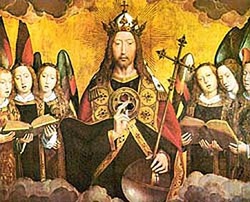
Editor's Note: On this 40th Anniversary of Roe v. Wade we pray that the U.S. Supreme Court will eventually overrule that decision. We pray that the Fifth Amendment protection against the deprivation of life and liberty without due process of law, applied to the States via the Fourteenth Amendment, extends to life in the womb. We pray that the opinion holds that the Fourteenth Amendment itself, which provides that no state shall “deprive to any person of life, liberty, or property, without due process of law; nor deny to any person within its jurisdiction the equal protection of the laws” applies to persons in utero. Finally, we pray that the opinion ends with this astonishing declaration:
The Constitution was not drafted and ratified in a moral or theological vacuum. The Framers lived in a society whose common law tradition still recognized the Law of God, and in particular the “divine positive law” of the Ten Commandments, as the ultimate source of human positive law. The classic commentaries of William Blackstone place this historical conclusion beyond serious dispute. The justices of this very Court take an oath to God, and we deliver our opinions while sitting beneath a frieze depicting Moses
the Law-giver holding the tablets containing the Commandments.
We recall here Dr. Martin Luther King’s historic declaration in his “Letter from a Birmingham Jail” in the midst of the civil rights movement of the 1960s: “One has not only a legal but a moral responsibility to obey just laws. Conversely, one has a moral responsibility to disobey unjust laws. I would agree with St. Augustine that ‘an unjust law is no law at all.’” For too long, the legal distortions created throughout the fabric of this nation by our unprecedented decision in Roe have placed conscientious Americans in the same position as Dr. King, writing from his jail cell. Indeed, Roe has given rise to a new civil rights movement and concomitant social turmoil that show no signs of abating nearly forty years after Roe divided this nation in a way not seen since the abolition movement that followed the everlasting embarrassment of our decision in Dred Scott v. Sandford, 60 U.S. (19 How.) 393 (1857).
But beyond a mere appeal to history, which provides the context for our
textual interpretation, we hold today that the Constitution’s morally freighted terms “person,” “life,” and “liberty” cannot be considered apart from the same ultimate source of moral authority that Blackstone, our nation’s common law tradition, and Dr. King had in view. As this Court observed in Zorach v. Clausen, 343 U.S. at 314, “We are a religious people whose institutions presuppose a Supreme Being.” Men are creatures of that Supreme Being, accountable to Him for any human law that contravenes His law, which is written on the heart. Our unfortunate decision Roe is such a human law. We overrule it today, not only in the name of history and tradition, but in the name of God. [1]
[1] Christopher Ferrara, Liberty The God That Failed: Policing the Sacred and Constructing the Myths of the Secular State, from Locke to Obama (NE: Angelico Press, 2012), 638-639.
 RSS Feed
RSS Feed
